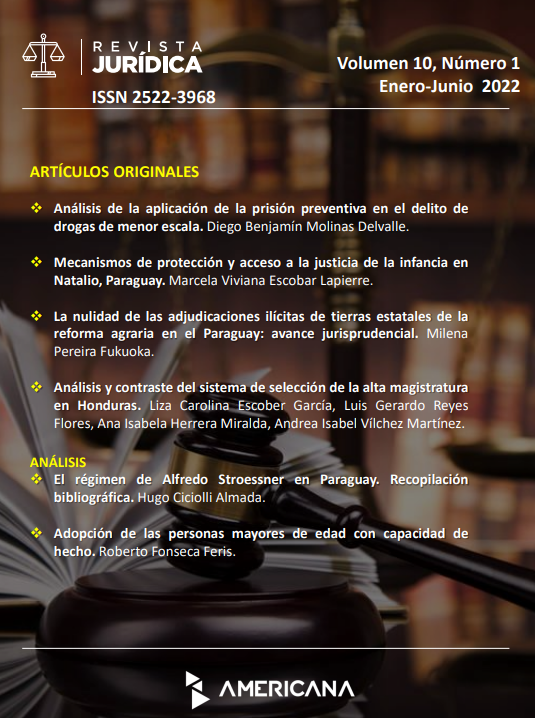Adoption of people of legal age with de facto capacity
Keywords:
Adoption, adults with de facto capacity, requirements, constitutional principles, ParaguayAbstract
Adoption has gone through different stages in its history, the ancient romans used it to maintain their lineage and regulated both the adoption of minors and adults and emancipated. At present, when adoption is spoken of as a legal institution in Paraguay, it tends to be related to children and adolescents; but that interpretation leaves out the possibility of legal regulation of the adoption of people of legal age who have de facto capacity and who, for biological reasons, do not have filial ties with the family that took them in. The fundamental purpose of this work focused on analyzing the foundations for which it is necessary to introduce in the Paraguayan civil legislation the adoption of adults with de facto capacity, for which a legal comparison was made with the legislation of Latin America and that of Spain, doctrinal criteria were collected, as well as the study of the constitutional principles and human rights that are related to this legal institution. The research was of documentary design with a descriptive level and the systematic and hermeneutic methods were used. As a main conclusion, it was reached that not regulating this type of adoption in the country is discriminatory, violates the right to equality, to form a family and the right to identity, for which a modification in the national legislation is required.
Downloads
References
Código Civil y Comercial Argentina. Aprobado por ley 26.994 Promulgado según decreto 1795/2014. http://www.saij.gob.ar/docs-f/codigo/Codigo_Civil_y_Comercial_de_la_Nacion.pdf
Código Civil y Comercial Perú. Decreto Legislativo Nº 295/1984. https://www.oas.org/juridico/PDFs/mesicic4_per_cod_civil.pdf
Convención Americana de los Derechos Humanos. (1969). Aprobado en la Conferencia Especializada Interamericana de Derechos Humanos. Costa Rica. https://www.refworld.org.es/docid/57f767ff14.html
Correa, S., Lagos. M. (2014). Evolución de la institución de la adopción desde el derecho romano hasta la actualidad. Chile: Universidad Finis Terrae. https://repositorio.uft.cl/xmlui/bitstream/handle/20.500.12254/225/Correa-Lagos%202014.pdf?sequence=1&isAllowed=y
Declaración Universal Derechos Humanos. (1948). https://www.un.org/es/about-us/universal-declaration-of-human-rights
Ferrer, F. (1984). Adopción, En Rubinzal y Culzoni (Ed), Derecho de Familia (pp. 113-236). https://archivos.juridicas.unam.mx/www/bjv/libros/3/1446/1.pdf
Ley de Adopciones Guatemala. Decreto 77/2007. http://www.cna.gob.gt/Documentos/Ley_de_Adopciones.pdf
Ley 1098/2006. Código de la Infancia y la Adolescencia Colombia. https://www.oas.org/dil/esp/codigo_de_la_infancia_y_la_adolescencia_colombia.pdf
Ley orgánica para la protección de niños, niñas y adolescentes g.o. (5.859 Extraordinaria) 10/12/2007. Asamblea Nacional de la República Bolivariana de Venezuela. https://www.oas.org/juridico/PDFs/mesicic4_ven_ley_org_prot_ninos_adolc.pdf
Ley 1136 del año 1997. Ley de Adopciones Paraguay. https://www.bacn.gov.py/leyes-paraguayas/9166/ley-n-1136-de-adopciones
Real Decreto de 24 de julio de 1889 por el que se publica el Código Civil Español. https://www.boe.es/buscar/pdf/1889/BOE-A-1889-4763-consolidado.pdf







